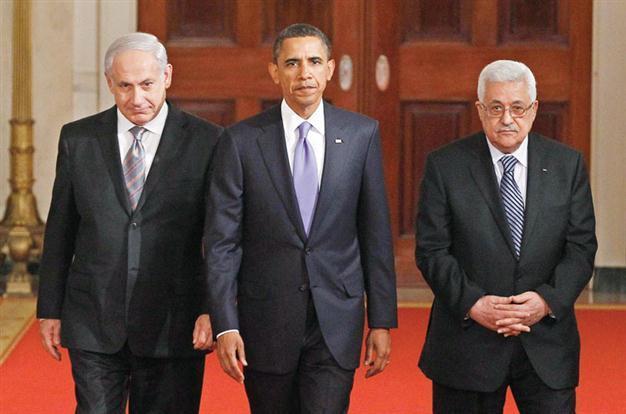Palestine and Israel blame each other on peace talks
RAMALLAH / JERUSALEM

Israeli Prime Minister Benjamin Netanyahu (L), US President Barack Obama (C) and Palestinian President Mahmoud Abbas are seen in this file photo. Netanyahu and Abbas blame each other for an impasse in newly launched peace efforts. AP photo
The leaders of
Israel and
Palestine blamed each other Jan. 29 for an impasse in newly launched peace efforts, raising doubts about whether the dialogue would continue just weeks after it began. The exchange of heated words came just days after Palestinian prime minister said it was hard to be hopeful about the current prospects for peace.
Palestinian President
Mahmoud Abbas accused Israel of spoiling the low-level talks, adding that it had failed to present detailed proposals for borders and security requested by international mediators. Israeli Prime Minister
Benjamin Netanyahu, in turn, accused his counterparts of refusing to “even discuss” Israeli security needs.
For the past month, the sides have held Jordanian-mediated exploratory talks at the urging of the Quartet of international Mideast mediators, the United States, the United Nations, the European Union and Russia. The goal of the talks has been to find a formula to resume formal peace negotiations, with the aim of forging an agreement this year. The Palestinians have said a three-month period set by the Quartet for the exploratory talks ended last week, counting from the day the mediators issued their marching orders last October.
Abbas said Israel’s efforts so far had fallen short. “By not presenting a clear vision on the issues of borders and security, as the Quartet demanded, Israel foiled the exploratory talks in Amman,” Abbas said in remarks published late Jan. 28 by Palestinian news agency Wafa.
‘Signs are not very good’Israel has said it wants to continue talks and is serious about reaching a deal by year’s end. Tel Aviv said the exploratory talks should continue for another two months, calculating the Quartet’s three-month period from the beginning of meetings in early January.
Addressing his Cabinet Jan. 29, Netanyahu said the dialogue had had a rocky start, but held out hope the talks would continue, the Associated Press reported. “Until this moment, according to what happened in recent days, the Palestinians refused to even discuss with us the needs of Israel’s security,” he said. “The signs are not very good, but I hope they will come to their senses and we’ll continue the talks so we can reach real negotiations.”
On Jan. 26, Palestinian Prime Minister Salam Fayyad expressed pessimism on the matter. “I do not think the conditions are actually ripe or right for the meaningful resumption of political process,” he said. The Palestinians want to establish their state in the West Bank, Gaza Strip and east Jerusalem, territories Israel captured in the 1967 Mideast war.
GAZA’S PM LEAVES FOR REGIONAL TOUR
GAZA CITY - Agence France-Presse
The head of the Hamas government in Gaza, Ismail Haniyeh, left yesterday for a regional tour expected to include stops in Iran, Qatar and Bahrain, his spokesman told. Prime Minister Haniyeh “will go to Qatar on a special Qatari plane departing from the Al-Arish airport for a Tuesday meeting with the emir of Qatar,” spokesman Taher al-Nunu said. Haniyeh is travelling with his political adviser Yussef Rizq, his minister of housing and public works Yussef al-Mansi and two key Hamas members -- Yehia Sinwar and Rawhi Mushtaha -- released from Israeli prison last year under the deal that saw captured Israeli soldier Gilad Shalit freed. During his visit to Qatar, Haniya is expected to hold meetings with Crown Prince Tamim Bin Hamad al-Thani and key Sunni religious figure Yussef al-Qaradawi, Nunu said. The trip is also expected to include stops in Bahrain and Iran, where Iranian President Mahmoud Ahmadinejad has issued an official invitation to the Hamas leader, Nunu said. The trip will only be Haniyeh’s second since his Hamas movement swept 2006 elections and then routed Fatah forces from Gaza in fighting that erupted in the summer of 2007.
